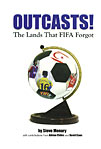 The Lands that FIFA Forgot
The Lands that FIFA Forgot
by Steve Menary
Know the Score, £16.99
Reviewed by Jonathan Wilson
From WSC 253 March 2008
Every country, Henry Kissinger once said, needs an army, a bank and a football team. Many of the countries discussed in Outcasts don’t have an army or a bank. Many aren’t even countries, at least not in the traditional sense. And yet all are desperate for a football team that would somehow give them legitimacy. When Tibet played Greenland in a friendly in Copenhagen, who did not see it as a strike against the Chinese authorities who would deny them statehood? And yet there is a sense in which Greenland are rather more wronged than Tibet, at least in terms of FIFA’s refusal to acknowledge them as a member.
In political terms, Greenland has the same status as the Faroe Islands, enjoying self-rule within the Danish Commonwealth. In football terms, though, they do not. The Faroes are a member of both FIFA and UEFA, Greenland are not, and the only reason is that they applied later. As Gibraltar stepped up its claims for full membership in the late Nineties, UEFA changed their rules to include only those countries “recognised by the United Nations as an independent state”.
That helped stifle Gibraltar’s bid – and so kept Spain onside – but Greenland fell by the same rule, even though it is probable that were its application put to a vote of UEFA members, it would be passed unanimously. Of course, if the rule were to be applied retroactively, England, Scotland, Wales and Northern Ireland would equally find themselves outside the international fold.
That suggests a certain arbitrariness and, indeed, of FIFA’s 207 members, 23 are not members of the UN. If the French territory of New Caledonia can be a member, as Steve Menary points out, then why not Zanzibar, which has local autonomy but is technically a part of Tanzania? FIFA’s reply was that there was an ongoing process of “autonomisation” in New Caledonia, but not in Zanzibar. That is debatable, but what is interesting is, given the boost to national self-esteem just playing international games brings, FIFA are probably helping along the process of independence. To many, becoming a member of FIFA has become a political end in itself.
Menary is an admirably sure-footed guide to such negotiations, but it should be made clear that, while there is much about the politicking, there is also much anecdotal material: he never loses sight of the human stories. His tale of lending a dictaphone to the manager of the Falkland Islands after his mobile phone signal is cut off so he can record his commentary of a famous victory is particularly touching, and indicative of the empathy he has with those about whom he is writing.
In fact, if there is a criticism, it is that Menary is rather too generous and balanced, treating with equal sympathy the claims of, for instance, Occitania – an area of south-eastern France without any claim for independence, for whose “national” team the only criterion is being able to speak the ancient language of Occitan – and Kosovo and Northern Cyprus, for whom independence and recognition are realistic and current goals. Still, generosity and balance aren’t exactly bad faults to have, and the result is a gentle meditation not merely on the power of football, but also on what it means to be a country.